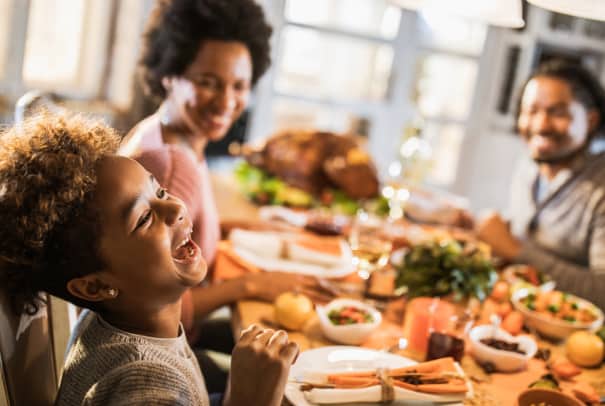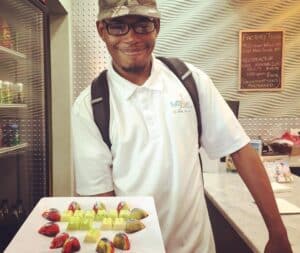Choosing to Grow
Photo credit: Skyneasher, for Getty Images
Families with Growth Mindset
“Cooking is the art of adjustment.”
Jacques Pepin
The heart of most homes is the kitchen. It doesn’t even matter to kids whether you’re a particularly interesting cook.
Children feel safe when there is food in the fridge, and hot meals on the table. Taking snacks into account, that gives parents three to five opportunities each day to say, “I love you,” with just an ordinary fork or spoon.
Add leisurely conversation around the dinner table (with no TV or technology, please and thanks). Research says you have an ideal recipe for happy children with great social skills and self-esteem, lifelong health, and well-developed palates.
Before the pandemic, some of us were concerned about how we were eating. Too much fast or processed food, too many meals in the car. Too rushed to teach simple life skills like cooking, budgeting, washing up. Too much money on takeaway, and too tired to worry about it.
Then suddenly, we came back home. New work-life balance meant sharing space and figuring out how to personally educate our children. We got creative about meals and snacks when it was not simple to run out to the store. Some tried breadmaking, others simmered economical soups. We tried new recipes and found new rhythms. Changing the pace made cooking together a great opportunity to connect with our kids.
We also connected the dots between good food and good health. Improving nutrition was one of the best ways to protect our immune systems. Balanced meals helped us survive the long months without exercise outdoors.
We also became very mindful of the families struggling with economic fallout from the pandemic. We shared more with our community, and got the kids involved in helping others.
And then we wondered what it might be like to start a garden at home. It could be amazing to grow our own salads, to snip fresh herbs when we needed them. We grew up on local beans and peas, tomato and peppers, sweet potatoes and okra. Learning how to cultivate some of our food would save both time and money, and improve family food security.
It’s one thing to explore alternatives when we are forced to do so.
How do we change our priorities and make better choices, when getting started is uncomfortable, even hard?
GROWTH MINDSET
The answer may lie in a big idea called “growth mindset”. It is a concept schools have recently introduced. A growth mindset:
- Develops self-esteem and motivates a child
- Holds that intelligence and personality can be developed
- Teaches that potential is connected to learning, and success to effort
- Encourages a child to embrace challenge rather than resist change
- Stimulates a hunger to learn, rather than craving for approval
- Emphasizes presence over praise or performance
- Shifts the inner voice from self-criticism to constructive motivation
- Says, “Not yet…you haven’t figured it out…yet…”
- Knows that practice and perseverance are the path to success
- Helps us take responsibility for our faults, then make decisions with better outcomes
- Makes relationships more realistic and successful
- Is a powerful remedy for shame.
FIXED MINDSET
The opposite concept, or having a fixed mindset:
- Believes people are born with intelligence and personality
- Is skeptical about a person’s ability to develop potential and improve results
- As a parent or teacher, praises children for achievement and performance rather than for effort
- Tends to create students who are afraid of trying, if they feel they may fail
- Creates a shame-based family or school culture
- Makes learning fearful or intimidating
- Can produce children who lie rather than face their faults
- Sets up unrealistic relational expectations. Fixed mindset kids grow into adults who believe in one “true love” and seek perfection. They see a partner’s weakness as a fundamental flaw, not as a trait that can be developed.
MAKING THE CONNECTION
So how does our conversation about cooking and gardening relate to growth mindset? Well, meals are where we converse, connect, and develop family life. That seems like a great place to practice and learn! Taking a growth mindset into our kitchens, to homework on the counter, to conversations at table, even into our gardens, can establish new ideas, nurture them patiently, and reap new outcomes.
BENEFITS OF GROWTH MINDSET
The benefits include…
Pushing past mental blocks
- Becoming mindful about eating as nourishing energy, not as reward or punishment
- Awareness that a child’s palate is not fixed (“he hates broccoli”), and that taste can be developed
- Believing that we can choose healthier lifestyles, even if the journey goes against family or culture
- Becoming curious about new foods and flavors
- Choosing a nurturing attitude in the kitchen (instead of dread, feeling forced, or resentful)
- Realizing that cooking is a life skill each human needs in order to thrive
Modeling
- Recognizing children learn by how we speak to them, and by how we treat ourselves when we make mistakes
- Leading conversations about what you are learning, how you are choosing to grow
- Cultivating micro environments where your family can try new things (like recipes or gardens), make adjustments, and work around challenges
- Strengthening family communication, collaboration, and culture. Here are some podcasts you can play to start the conversation. Go for a drive together or huddle over a fun recipe while you listen and learn.
Social Outcomes
- Families build our communities. Families who are willing to grow, embrace challenges, and engage lifelong learning, become vibrant contributors to national success.
- Instead of ignoring human potential, these families see opportunities for development and change. They are willing to help others succeed.
- Families who help one another grow become citizens with the courage and tools to respond to challenging, rapid change in business and society.
REAL FAMILIES WITH A GROWTH MINDSET
Here are three stories of families with a growth mindset. The Haubers are farmers who wanted to make changes to their lifestyle at home. For the Jenkins, raising chickens has taught the family some powerful life lessons. Will Godet grew up on an urban farm that opened a path to his future. When his mother lost a contract to sell her local, organic tomatoes, she unearthed an amazing agri-business opportunity.








